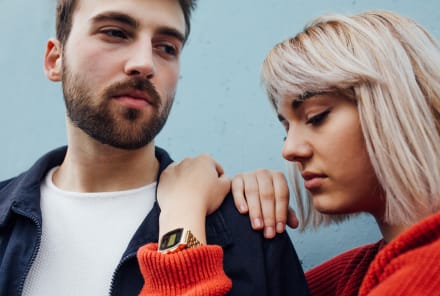Advertisement
Why Falling In Love Makes People Crazy

Human beings possess two distinct and opposing instincts: the desire to merge with another and the need to remain an individual. Both are vital. Just as an infant and mother bond, newly joined lovers tend to become immersed in their intense feelings for one another, and feel a magnetic draw to attach themselves to each other.
And, just as the infant must one day push against her mother to become herself, we, too, need to eventually create boundaries in our relationships, and make sure to preserve the edges of our individuality. Particularly at the beginning of a relationship, during the so-called "honeymoon phase," pushing our lovers away is the last thing we want to do. We want to stay in what I call the "merge cycle" — and why wouldn't we? It feels so magical.
Some lovers try to stay inside the love bubble as long as they can by creating their own private culture. They invent a language of their own that nobody else can understand. They share jokes with punch lines that are funny only to them. Within the perceived safety of the bubble, their merge feels at once total and eternal. It was in just such a bubble that film star Ingrid Bergman and her husband, Peter Lindstrom, named their daughter Pia, with the three letters standing for Peter, Ingrid, Always. Alas, the marriage fell apart, but Pia's name remained a reminder of love's possibilities and its fragility — always.
Of course, not everyone experiences the "urge to merge." Some people never feel it at all. Or they enjoy an initial hit of ecstasy that quickly dissipates. Some people enter love slowly, with a friendship that gradually leads to an intimate partnership — one that may or may not be spiced with romance. Others choose a partner because they feel that "it's just time," which may coincide with the accelerating ticking of the biological clock.
Still others focus on similarities based on ethnicity, race, religion, education, class and life goals. Indeed, in many cultures, selecting a mate has little or nothing to do with falling in love. Nonetheless, so much of our culture — songs, movies, fairy tales, novels — leads us to believe that idealized love is the norm. We await the hero or heroine who will kiss us awake.
A Kind of Madness
This first stage of love has been chronicled for as long as human beings have been on the planet. We hear most often of "lovesickness," a series of anxiety-related symptoms brought on by the intense changes associated with falling in love. Ibn Sina, tenth-century physician and father of modern medicine, viewed obsession as the principal cause of lovesickness.
We now know that he was right. The biochemical changes that take place in new lovers produce symptoms similar to in those with obsessive-compulsive disorder, including loss of appetite and sleeplessness. Ah, and how well we know the signs of obsession ... Fantasies of the beloved fill our days and crowd our nights; when we're apart, we feel incomplete. If absence makes the heart grow fonder, it also leads to constant chatter about the missing object of affection. This fixation and preoccupation are what others find tiresome about the love-struck. People roll their eyes and think us temporarily insane. Which, of course, we are.
In 1979 psychologist Dorothy Tennov coined the term limerence to describe this temporary state of madness and described the conditions associated with it:
- Overestimation of the good qualities of the beloved (and minimization of the negative)
- Acute longing for the object of one's affection
- Feelings of ecstasy in the presence of the loved one
- Deep mood swings from ecstasy to agony and back again
- Involuntary, obsessive thinking about the other
- Deep agony when the relationship ends
The list reminds me of an old client of mine named Stu, a recovering alcoholic. Once, he told me an anecdote about the first time he got drunk at age fourteen. "We had beer and wine hidden in the trunk and pulled the car over to try it," he described, "My friends took their time, but the moment I took my first drink I was hooked. I passed out that night and got really sick, and yet still couldn't wait to have another drink. The sun would rise and the longing set in. I craved the next drink the way my friends longed for a girlfriend."
It startled me to hear how his words could have just as easily described what it feels like to fall in love with another person. "I just had to have it," meaning alcohol and "I just had to have him or her" do not seem very far apart.
The reason for this is simple, if a bit surprising: new lovers do have much in common with addicts. Magnetic resonance imaging reveals that the nucleus accumbens, the part of the brain that is activated in lovers, is the same part that lights up in cocaine users and gamblers when they act out their addiction.
This recent discovery brings to mind the old adage: magic is science not yet understood. What we do know, however, is that the craving associated with romantic love is very real. Greek mythology provides us with imaginative and amusing ways to describe the felt intensity of romantic love. Aphrodite, the goddess of love and beauty, had a son named Cupid. His job, as an archer, was to dip arrows into his mother's secret love potion before he took aim. Once Cupid's arrow hit its target, the victim fell madly in love with the next person he or she saw.
This myth has given rise to some of the most extraordinary love legends of all time, including those of Apollo and Daphne, Helen of Troy, Antony and Cleopatra, and Romeo and Juliet. We now know that the "hit" of romance can be partially explained by biochemistry. Science tells us that the pounding heart that leaves us breathless, trembling, and longing to be with our beloved signifies an overabundance of particular chemicals and hormones in the brain and blood, including PEA (phenylethylamine), a natural amphetamine also found in chocolate and marijuana.
As they float on a sea of PEA, lovers report more sensational and adventurous sexual experiences than they've ever enjoyed before, such as "mile-high sex" and a heightened pleasure in sensory qualities that might normally be a turnoff. Napoleon Bonaparte, for example, once wrote to Josephine, "I'm coming home. Please don't wash".
As if a generous shot of PEA weren't enough, the love cocktail is also spiked with endorphins, which boost pleasure and decrease pain, and oxytocin, a hormone that promotes bonding and cuddling. This cocktail infuses us with euphoria and extraordinary energy, which is why sleep and nourishment seem unimportant. Our perspective becomes so skewed that we see only what is good and beautiful in our lover; we're blind to all else.
To fall in love is arguably a passive process . For love to last is not. Long-lasting love results from the necessary work that two people do — the self-work, primarily — to create a strong, durable partnership over time.
The preceding post is a modified excerpt of Linda Carroll's new book Love Cycles: The Five Essential Stages of Lasting Love. Copyright © 2014 by New World Library.











